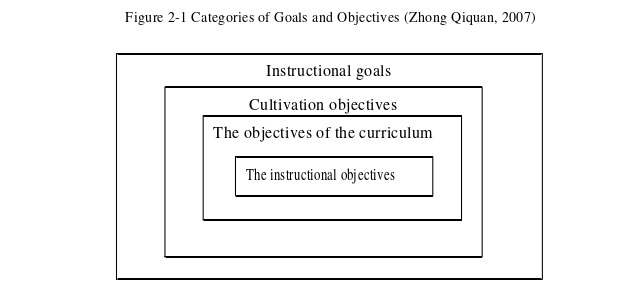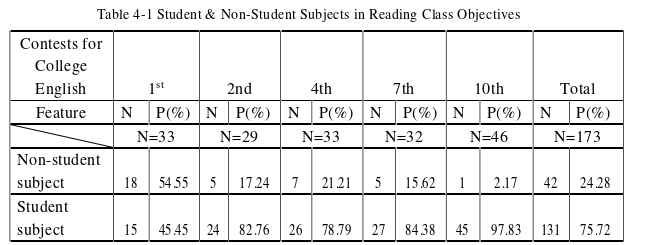本文是一篇英语论文,本研究旨在探讨大学英语教学目标设置的深层次学习特点。首先是考察教学目标陈述是否以学生为被试。第二是考察大学英语教学目标所涵盖的深度学习能力的数量。第三是检查教学目标是否涉及更高层次的思维。
Chapter One Introduction
1.1 Background of the Research
Objectives setting functions as the starting point and the final destination of teaching activities, which regulate the whole instructional process (Li Rumi,1997). Instructional objectives are regarded as the orientation in the design of teaching procedures with activities. They are also taken as the criteria for the evaluation of the class. Brown (2001) points out that objectives can be used to direct language teaching without interfering with the techniques and exercise chosen by teachers in the classroom. Therefore, objectives setting plays a significant role both in the teaching process and the teaching outcome so as to ensure effective teaching.
Deeper learning is an issue of great concern and receives encouragement in English language teaching. The Ministry of Education advocates the “Gold Class”, which shares the same idea of deeper learning. Objectives setting with deeper learning features will help to achieve “Gold Class”.
For a long time, studies on instructional objectives are devoted to the theoretical foundation for objectives setting, the problems and their causes in objectives setting, as well as the procedures and principles for objectives setting. This present research focuses on College English instructional objectives setting by going further into the investigation of their deeper learning features.
1.2 Significance of the Research
This research aims to investigate whether the contestants’ objectives design presented in SFLEP National Foreign Language Teaching Final Contests (College English Group) are targeted at deeper learning, thereby detecting the strengths and weaknesses of College English objectives setting.
The present research attempts to figure out the deeper learning features of instructional objectives with deeper learning-related theories, aiming to identify how much deeper learning is achieved in College English classes.
This research has theoretical significance. The deeper learning features of instructional objectives are investigated by following the objectives setting rules, by identifying the deeper learning competencies, and by detecting the higher-ordered cognitive levels. These three dimensions are the combination of the theories in objectives setting, in deeper learning, and in Bloom’s categories of cognitive processes. Therefore, the research not only enriches the related theories in deeper learning study, but also the related theories in objectives study. This research also has practical value.
The instructional objectives are examined to measure what deeper learning features they carry and how much they tend to achieve deeper learning classes. The statistics will display the strengths and weaknesses of College English objectives setting by taking the student subject, the deeper learning competencies, and the higher-ordered thinking into consideration, which will be helpful for College English teachers to make reflection on their objectives setting and their deeper learning classes.
Chapter Two Literature Review
2.1 Instructional Objectives
This section discusses the definitions of instructional objectives, requirements of College English instructional objectives, and the requirements of instructional objectives setting.
2.1.1 Definitions of Instructional Objectives
Instructional objectives are at the lowest-leveled position in the hierarchy of description of educational goals. It is different from educational goals, which attempt to delineate in general terms what the program hopes to accomplish within the time allotted (Brown, 2001: 72). Educational objectives, a subordinate concept of instructional goals, are educational values that are embodied by different types of education and different educational stages (Yang Mingquan, 2016:235). Cultivation objectives, targeted at an educational stage or a type of school, interprets instructional goals uniquely and pertinently and shows the features of a school and the thoughts of school management (Zhong Qiquan,2007). And the objectives of the curriculum refers to the abilities, attitudes, habits, appreciation, and knowledge that people need to master and foster (Zhou Xingguo & Duan Xiaobing, 2012:56). Their relationship is interpreted by the following diagram (Zhong Qiquan, 2007).

2.2 Deeper Learning
This section first clarifies why deeper learning is used rather than deep learning. And then, the definitions of deeper learning are elaborated from three perspectives. A comparison is made between deeper learning and surface learning for further understanding of the term. And College English deeper learning instructional objectives are also discussed in this section.
2.2.1 Definitions of Deeper Learning
Deeper learning is a new pedagogical term, which was originated in Education for life and work: Developing transferable knowledge and skills in the 21st century (2012), while deep learning is the term in the field of machine learning. People usually understand deeper learning from the following three perspectives: deeper learning is a learning approach; deeper learning is a learning process; and deeper learning is a set of learning objectives.
Deeper learning is an approach that involves advanced cognition. The outcomes of learning are commensurate with the level of cognitive processing and the strategies that the learner takes. Marton and Säljö (1976) state that students who adopt surface learning approach direct their attention towards learning the text itself, which means they only try to memorize the learning materials as much as possible. However in deep-level processing, students focus on the intentional content of the learning materials (ibid.). Biggs (2011) defines deeper learning as activities that are appropriate to achieve the outcomes including acquisition of robust core academic content, higher-ordered thinking skills, and learning dispositions. Ramsden (2003) and Entwistle (1998) show seven defining features of deeper learning approach: 1) it focuses on understanding meaning and maintaining the structure; 2) it relates previous knowledge to new knowledge; 3) it relates knowledge from different courses; 4) it relates theoretical ideas to everyday experience; 5) it relates and distinguishes evidence and argument; 6) it organizes and structures content into a coherent whole; 7) it is an internal emphasis.
Chapter Three Research Design............................... 23
3.1 Research Questions ......................................... 23
3.2 Research Samples ................................... 23
3.3 Research Methods .......................................... 26
Chapter Four Results and Discussions ............................... 29
4.1 Deeper Learning Features of College English Instructional Objectives ........ 29
4.1.1 Feature of Student-Subjects in Objectives .............................. 29
4.1.2 Feature of Deeper Learning Competencies in Objectives .................. 31
Chapter Five Conclusion .............................................. 58
5.1 Major Findings of the Research .......................................... 58
5.2 Pedagogical Implications of the Research ....................................... 60
Chapter Four Results and Discussions
4.1 Deeper Learning Features of College English Instructional Objectives
This section discusses the features of those collected College English instructional objectives taking student-subjects, deeper learning competencies, and higher-ordered thinking into consideration. It first investigates the objective statements with student and non-student subjects in reading classes and listening classes, and then explores the deeper learning competencies covered in the objectives in these two class types. At last, it discusses the thinking levels in the objectives in these two class types.
4.1.1 Feature of Student-Subjects in Objectives
In this section, the instructional objective statements in reading classes and listening classes are respectively categorized into student-subjects and non-student subjects. And then, those subjects are counted and analyzed.
As stated in Section 2.2.3, one of the basic features of deeper-learning instructional objectives is student-subject. The research samples are processed by UAM CorpusTool 3. The instructional objective statements using “learners”, “students” as subjects are marked as “student subjects”. Those objective statements with the words such as “I”, “teachers” as subjects are marked as “non-student subjects”. Some other objective statements omit their subjects, but their implicit subjects can be judged as student-centered or not. The data are presented in the following table.

Chapter Five Conclusion
5.1 Major Findings of the Research
The present research sets out to investigate the instructional objectives setting in College English taking the deeper learning features into consideration. The first is to examine whether the instructional objective statements use students as the subjects. The second is to examine the number of deeper-learning competencies are covered by College English instructional objectives. The third is to examine whether the instructional objectives involve more higher-ordered thinking. Through careful analysis and discussion of the collected data, the following major findings can be drawn from the present study:
First, the deeper learning features of College English instructional objectives are elaborated as follows:
(1) The instructional objective statements with student-subjects outweigh those with non-student-subjects no matter whether they are reading class objectives (75.72%) or listening class objectives (78.53%). This indicates that most College English teachers keep the strong belief taking the students as the center of their teaching, which is the prerequisite and the strong indicator of deeper learning.
(2) All the six deeper-learning competencies are covered by the collected objectives statements, whereas not all of the six deeper-learning competencies are covered by each of the five national final contests. The competency master core academic content receives overemphasis among the six competencies since it accounts for the largest proportion in reading classes (54.84%) and in listening classes (48.68%), while some other competencies, such as work collaboratively, communicate effectively, learn how to learn, and develop academic mindsets are much less noticed by College English teachers. This suggests that College English teachers spare more devotion to students acquiring information rather than to their all-round development, which is not regarded as the depth of learning.
reference(omitted)
